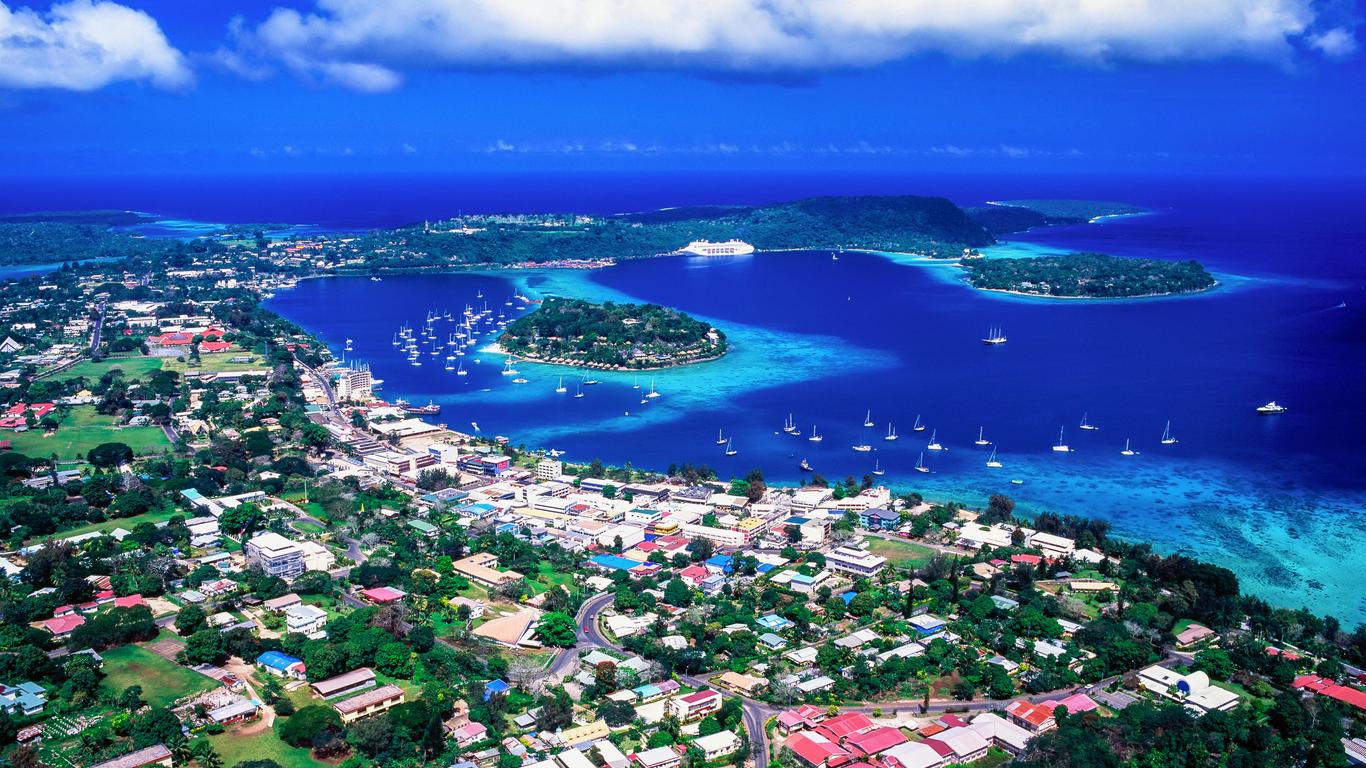Vanuatu or the republic of Vanuatu is located in a pacific island located in South Pacific Ocean. It also hosts a volcano called archipelago…

Vanuatu, nestled in the South Pacific Ocean, is a tropical paradise renowned for its pristine beaches, lush rainforests, and vibrant coral reefs. Comprising 83 islands with diverse landscapes ranging from volcanic peaks to turquoise lagoons, Vanuatu offers a serene escape into nature’s bounty. The capital, Port Vila, blends French and British colonial architecture with bustling markets and waterfront promenades. Indigenous cultures thrive in villages where traditions such as ceremonial dances and intricate wood carvings are cherished. The warm hospitality of the Ni-Vanuatu people enhances the allure of this island nation, where outdoor adventures like snorkeling, hiking through ancient jungle trails, and exploring active volcanoes await. Vanuatu’s rich cultural heritage, coupled with its breathtaking natural beauty, creates an idyllic setting for both relaxation and exploration amidst the rhythm of Pacific island life.
Vanuatu, a South Pacific archipelago of 83 islands, offers an idyllic setting with a relaxed lifestyle, vibrant culture, and close-knit communities. Known for its breathtaking landscapes, including volcanoes, rainforests, and pristine beaches, Vanuatu is a haven for nature lovers. However, it also presents unique challenges due to its remote location, limited infrastructure, and vulnerability to natural disasters. Here’s a look at the cost of living, quality of life, and social and cultural experiences in Vanuatu.
Housing in Vanuatu ranges from traditional thatched-roof bungalows in rural areas to more modern apartments and houses in urban centers like Port Vila and Luganville. Rental prices tend to be higher in these urban areas, reflecting the demand for housing and access to amenities, while rural villages offer more affordable options. Foreigners can purchase property under certain conditions, with real estate prices generally lower than in many Western countries.
Utilities such as electricity, water, and internet are available but can be costly due to the reliance on imported resources. Electricity and internet are typically reliable in urban areas, though rural and remote islands may experience occasional disruptions. Internet connectivity outside major towns tends to be slower and less stable. Access to public services, including healthcare and education, varies by location, with better services concentrated in urban centers.
Grocery prices can be relatively high due to import costs, especially for non-local goods. However, local produce like fruits, vegetables, and seafood is plentiful and affordable. Markets are a great place to find fresh, locally sourced food. Dining out is common, and options range from casual local eateries serving traditional dishes like lap lap (grated root vegetables with meat) to upscale restaurants offering international cuisine. The culinary scene emphasizes fresh seafood and indigenous flavors, providing a rich, social dining experience.
Vanuatu’s healthcare system includes both public and private providers, with public services funded by the government. Public healthcare facilities are basic and may lack specialized equipment and medications, especially in rural areas. Private healthcare offers higher standards but can be expensive, and medical evacuation to Australia or New Zealand is often required for serious emergencies, making comprehensive health insurance essential.
Education in Vanuatu is compulsory and free in public schools, but the quality varies, especially in rural areas where resources and teachers may be limited. Private and international schools in urban centers offer higher standards of education. For higher education, many students go abroad, often to Australia, New Zealand, or Fiji, as local tertiary education options are limited.
Vanuatu’s transportation infrastructure is primarily road-based, with limited public transport options. Taxis and minivans are available in urban areas, while domestic flights and ferries are essential for inter-island travel. Roads, particularly in rural areas, can be unpaved and poorly maintained, making travel challenging, especially during the rainy season. Navigating the islands often requires patience, with irregular transportation schedules and limited options.
Vanuatu’s culture is deeply rooted in its indigenous traditions, languages, and customs. Community life revolves around family and village gatherings, with ceremonies and traditional dances being central to cultural preservation. The pace of life is relaxed, with a strong connection to nature and communal living. Hospitality is a defining feature of Ni-Vanuatu culture, and visitors are often warmly welcomed into communities.
Vanuatu offers numerous opportunities for outdoor activities like snorkeling, diving, hiking, and exploring the islands’ natural beauty. Its coral reefs, marine biodiversity, and active volcanoes attract both residents and eco-tourists. Cultural events such as traditional festivals provide insight into Vanuatu’s rich heritage, while the tranquil, natural environment fosters a peaceful lifestyle.
Vanuatu’s economy is primarily dependent on agriculture and tourism, making it vulnerable to external factors like natural disasters and fluctuating global markets. Employment opportunities, particularly in rural areas, can be limited, and the country relies on external aid and investment to maintain economic stability. Living standards can be affected by these fluctuations, with commodity price changes impacting local livelihoods.
Navigating bureaucratic processes such as obtaining residency permits, business licenses, or land leases can be complex and time-consuming. Expatriates and newcomers often need to familiarize themselves with local regulations and cultural sensitivities to integrate effectively into Vanuatu’s administrative system.
Vanuatu is highly vulnerable to natural disasters such as cyclones, volcanic eruptions, and earthquakes, which can disrupt daily life and infrastructure. Climate change poses additional challenges, affecting agriculture, water resources, and coastal areas. Efforts to promote environmental conservation are crucial for preserving Vanuatu’s rich biodiversity and ensuring sustainable development.
In conclusion, life in Vanuatu offers a unique blend of natural beauty, community-oriented living, and rich cultural experiences. While the country provides a serene and welcoming environment, it also presents challenges related to infrastructure, healthcare, and natural disasters. For those seeking a relaxed lifestyle with a strong connection to nature, Vanuatu’s traditional culture, coupled with its stunning landscapes, creates a distinct and fulfilling living experience.